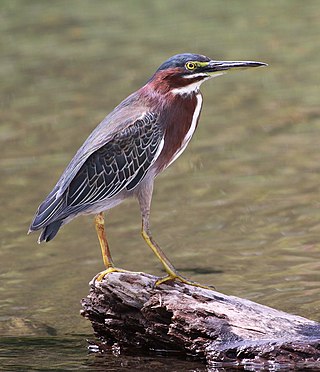
The green heron is a small heron of North and Central America. Butorides is from Middle English butor "bittern" and Ancient Greek -oides, "resembling", and virescens is Latin for "greenish".

The Acadian flycatcher is a small insect-eating bird of the tyrant flycatcher family.

Palmaria palmata, also called dulse, dillisk or dilsk, red dulse, sea lettuce flakes, or creathnach, is a red alga (Rhodophyta) previously referred to as Rhodymenia palmata. It grows on the northern coasts of the Atlantic and Pacific Oceans. It is a well-known snack food. In Iceland, where it is known as söl, it has been an important source of dietary fiber throughout the centuries.

Russula virescens is a basidiomycete mushroom of the genus Russula, and is commonly known as the green-cracking russula, the quilted green russula, or the green brittlegill. It can be recognized by its distinctive pale green cap that measures up to 15 cm (6 in) in diameter, the surface of which is covered with darker green angular patches. It has crowded white gills, and a firm, white stipe that is up to 8 cm (3 in) tall and 4 cm (1.6 in) thick. Considered to be one of the best edible mushrooms of the genus Russula, it is especially popular in Spain and China. With a taste that is described variously as mild, nutty, fruity, or sweet, it is cooked by grilling, frying, sautéeing, or eaten raw. Mushrooms are rich in carbohydrates and proteins, with a low fat content.

Micrommata virescens, common name green huntsman spider, is a species of huntsman spiders belonging to the family Sparassidae.

The singing honeyeater is a small bird found in Australia, and is part of the honeyeater family Meliphagidae. The bird lives in a wide range of shrubland, woodland, and coastal habitat. It is relatively common and is widespread right across Australia west of the Great Dividing Range, through to the west coast and on Western Australian coastal islands. It does not occur in other countries.

Cephaleuros virescens is an algal plant pathogen that infects tea, coffee and coconut plants, causing algal leaf spot or algal rust.

Cephaleuros is a genus of parasitic thalloid green algae comprising approximately 14 species. Its common name is red rust. Specimens can reach around 10 mm in size. Dichotomous branches are formed. The alga is parasitic on some important economic plants of the tropics and subtropics such as tea, coffee, mango and guava causing damage limited to the area of algal growth on leaves, or killing new shoots, or disfiguring fruit. Spores germinate on plants in the rainy season. Members of the genera may also grow with a fungus to form a lichen that does not damage the plants. There are 17 species in the genus, 13 of which grow between the cuticle and epidermis of infected plants while the remaining four grow intercellularly; interceullular species cause more damage to host plants.

Chloridea virescens, commonly known as the tobacco budworm, is a moth of the family Noctuidae found throughout the eastern and southwestern United States along with parts of Central America and South America.

Hemiselmis is a genus of cryptomonads.

Rivularia is a genus of cyanobacteria of the family Rivulariaceae.
Fragilariforma is a genus of diatoms belonging to the family Fragilariaceae.
Eudesme is a genus of brown algae belonging to the family Chordariaceae.
Pavlova is a genus of algae belonging to the family Pavlovaceae.











